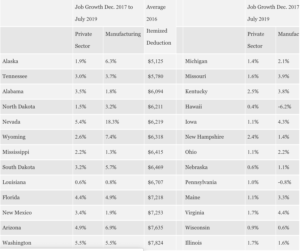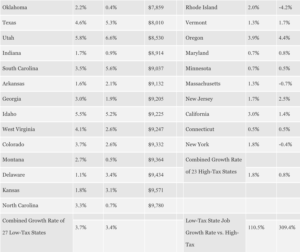The federal government just released its latest state-level jobs report, showing private-sector job growth remains concentrated in low-tax states. That has remained true since the 2017 tax cut limited the deductibility of state and local taxes (SALT) to $10,000 per filing household. The 27 states, led by Texas, with average SALT deductions under $10,000 saw private-sector payrolls grow by 3.7% from December 2017 to July 2019, 110.5% faster than the 1.8% growth in 23 states with a high tax burden.
The U.S. Bureau of Labor Statistics reported that the largest gains in nonfarm payroll occurred in Texas (+35,200), Florida (+22,900), and Washington (+13,400). None of these states feature a state individual income tax. Texas saw the largest over-the-year increase in nonfarm payroll employment in July with 323,300 more nonfarm jobs than 12 months earlier.
Reviewing manufacturing job growth, the same trend favoring low-tax states is even more evident, with manufacturing payrolls swelling 3.4% in the 27 low-tax states compared to 0.8% in the 23 high-tax states, a 309.4% advantage. The decision to invest in manufacturing is driven by more than tax rates, of course, with regulatory burdens, cost inputs—such as land, labor and energy—supply chain considerations and, increasingly, trade, all contributing to job growth. But the advantage is clear.
Nationally, after a strong start in manufacturing job growth 2017 and 2018, activity in the sector has slowed in 2019. Some analysts cite ongoing trade friction with the People’s Republic of China as one reason, with what appears to be a decoupling of the world’s two largest economies with an attendant reordering of supply chains occurring. But approval of the United States-Mexico-Canada Agreement (USMCA), the largest trade deal ever, would likely serve to accelerate the shift of manufacturing activity to North America.
The table below summarizes the employment growth from December 2017, the month the Trump tax cuts were signed into law, through July 2019 for both the private sector and manufacturing.


Of note is the Northeast’s weak manufacturing numbers, likely weighed down by both high taxes in the region as well as Gov. Andrew Cuomo (D-NY) continued blocking of access to new supplies of natural gas from Pennsylvania, forcing the region to rely more on natural gas imported from Russia and other overseas suppliers. The move has limited the ability of industry to secure reliable supplies of energy.
